- Home
- C. Sean McGee
The Anarchist (...Or About How Everything I Own Is Covered In A Fine Red Dust) Page 2
The Anarchist (...Or About How Everything I Own Is Covered In A Fine Red Dust) Read online
Page 2
Chapter One
The Teacher walked the halls with a certain swagger, as most teachers did, carrying on their shoulders, the weight of academic prestige. His though was of a more furnished veneer. He was conformed yes, as all academia hinged on accordance to set rule, but he was revolutionary in about how he conformed. And it wasn’t about anything that he did or in speaking to other professors, about anything that he said per se, there was just an air of cool that seemed to waft from his degage attire, as if he perspired, just a smidgen of free radical, amidst a heavy aroma of scholarly coherence.
And he hadn’t changed his ideals, not a single one, not since he himself was a young man, as fresh and acute as his students, like a clump of wet clay, impressionable and eager to be molded into a thing of purpose, of necessity and of use; like an off cut of metal, not fitting any ornament ideal, waiting to be carved into something neat and exacting, like a trigger.
He still wore the same loose fitting pants and run about sneakers, preferring to buy extra short laces so as not having to have them tied; meaning he could slip in and out of his shoes at any time if he ever wanted to. His hair too hadn’t changed much throughout the years, looking like a slightly overgrown hedge, a little long, uneven and a bit ruffled here or there, but not so much that it begged for a comb or hinted towards a lazy and untailored demeanor. It merely reflected, as a dressing on his philosophy, his penchant for coloring outside of the lines and walking the fine tethered line of adherence.
On his way to the car park, The Teacher, in his head, ran through some of the important things he still had to do before the march tonight. There were papers that had to be marked. He had been putting them off forever and now had a semester’s worth of essays cluttering his writing desk at home, meaning he’d never be able to start that book, not until his table was cleared.
He had to return those movies he rented last week. One was a documentary about socialism in South America and the other was an art-house film, a romantic comedy from Norway about a singer who paints his face and then falls in love with his own reflection called ‘The Clown is Sadder than the Penguin, but he does not Dance with Horse’s Hooves’.
Both were due back yesterday but the girl with the lip ring and the lisp, the one he found inexplicably cute, she didn’t work on Tuesdays and besides, if it was one day late, doctrine and accordance to rule would have him having to explain that the movie was late and apologize which in a way, would show to the inexplicably cute girl with the lip ring and a lisp, that, although he seemed to flout with authority and rule, he was in fact, a sweet and empathetic guy and he’d always have her home – not before or on, but right after her curfew, late enough to make an impression but not enough to rile anyone’s blood.
The Teacher wasn’t much for interaction, not outside his classroom anyway. He kept his head low as he walked down the hallways towards his car; not in a depressive or self-loathing kind of way. He just didn’t care much for the usual common type of banter, not like the other professors.
In his second hand electric car, he listened to Radiohead and as the traffic slowly drudged along, he crooned along to the music, singing horribly out of key while his face, crumpled and contorted, spoke of his disillusion for establishment. And it didn’t matter that he couldn’t sing because the radio was so loud that it looked like, to other drivers overtaking, in how passionately he was singing along, that he probably or most certainly could.
Arriving at his apartment, the only thing The Teacher could think of was the march that evening, that and having sex with Arabella in a dark alley as Alexander watched on, with protesters marching alongside, hurling flaming bottles and jagged stones in the direction of fleeing riot police, shooting canisters of tear gas over their shoulders as they cowardly retreated along the ruinous and war-torn avenue.
He preferred to park his car on the street, mainly so he could see it from his bedroom window and so people driving by would be able to read the host of socialist and ultraist stickers that were layered, like Tetris blocks, along the car’s panels and across its bumper.
In the elevator, he nodded politely to the other residents who got on and off at each floor, seeing a certain look from each as he continued to make his way up the towering building in the heart of the city, his straggly unkempt hair, prickly bush-like beard and his unsavory drab apparel, a stark contrast to the fine threads of sophistication and glamor which nodded back in their own conceited and patronizing manner.
And as the doors opened and closed and as smart and successful people – beautiful people – all lined into the elevator, he continued to smile as if he gave a shit, dreaming about fires and earthquakes and rampant militant action; young men with their faces scarved, kicking at shop front windows and setting fire to Gucci wearing mannequins while in the back of the store, while Arabella watched on, he had sex with Alexander.
“Good Afternoon Master,” said Eunice, opening the front door and curtseying as The Teacher entered the apartment, throwing his jacket onto the floor and ignoring completely, the look of foreboding, like a terrified puppy before a whipping, in the little servant woman’s eyes.
“Mummy?” he shouted. “Daddy?”
He turned to Eunice, his eyes snapping like a mouse laden trap into a sneering, malefic stare. “Where is mummy?” he said.
Eunice panicked to assemble her thoughts, stumbling through nervous stutter as if she had just been caught licking chocolate from the back of the spoon like some thieving scoundrel.
“Umm. I, uh, Your mother, she uh” she said, cursing silently to herself that she were not born a turtle so as maybe she could recoil her head and her limbs and take refuge inside of her white pleated uniform, expecting, at any second, the young man to extend himself beyond the threshold of reason and shout cruel and hysterical taunts, whilst throwing something heavy and pointed in her direction.
“Uh, uh, uh, uh, uh” mocked The Teacher, gesturing with one hand over his head, hanging onto an imaginary branch and the other, scratching the curve of his sweaty pits, connoting that Eunice, the little black servant, might seem more at home with a banana and a swinging vine, than with the rigors of converse. “Don’t be such a fucking cliché” he said.
The little servant nodded her head, kneeling down to pick up the young man’s jacket. She had no idea what he meant, but she would find out when everyone had gone to sleep. She would sneak into the office and forage through all of The Father’s books, to see if she could find that word. And when she found it, she would study its meaning and she would imagine all of the times she had done it or been it, and she would make sure she would never be like that ever again, no matter what she had to do. But Master called her so many words every day, so many new and fancy sounding words that she didn’t know and couldn’t even pronounce, so she would need a lifetime of surreptitious study if she were to ever be proper.
“Is there chocolate milk?” asked The Teacher.
“I shall bring it right to you Master,” said Eunice.
“I’ll be in my room,” he said. “But don’t come in. Leave it outside and knock three times. Not on my door, though. I hate it when you knock on my door, especially when I’m in the middle of something important.”
“Yes Master,” she said, curtseying.
The Teacher slammed the door behind him, loud enough so that whatever his mummy and daddy were doing, they would know that he was home and that he wasn’t in a good mood, so they had better tread carefully.
There came a wrapping on a door. It wasn’t his door. It was the servant’s door; through the kitchen and off from the laundry. But the wrapping, it was just loud enough so The Teacher could hear and assume what it meant.
He wasn’t happy, though, even if it did mean his chocolate drink was waiting outside. That was hardly the point. It was just that everyone was always going out of their way to be louder than they really had to be; always.
Eunice for example, she couldn’t just pick a doorframe nearby and gently knock it, no, she had put herself all the wa
y in the back of the apartment, somewhere completely out of the way which, for her made complete sense, but for the sake of telling someone that their chocolate milk is outside their door… God! And it may have sounded like gentle wrapping on a door; it might have if you didn’t know how far the sound had to travel and how hard she’d actually have to be hitting the wooden doorframe just to make it sound like a gentle wrapping.
And that’s what stuck in The Teacher’s mind.
It wasn’t the gentle wrapping, that which sounded as light and perturbing as the creaking of an old weather board house as it stretched out its demons on a cold winter’s night. It wasn’t the smell of fresh hot chocolate either, that which was waftng through the cracks in the bedroom door and tickled at the young man’s one still remaining childhood pleasure.
It was in knowing that wherever she was, trying to conjure a gentle wrapping, she was, in fact, doing just the opposite. It didn’t matter if it sounded affable because The Teacher knew that she was somewhere far, around some untraveled and uninspected bend in the apartment, straining and cursing and swinging her angular arms to beat a sturdy wooden spoon against an even sturdier wooden doorframe.
“God,” he said out loud, “You’re all just so… Fuck it” he said, opening the door and taking his hot chocolate from the floor and then locking his room once more.
He could hear his mother and father talking in the living room. His father was probably going on about some stupid case he was working on, helping to make the rich even richer, just like he did. And his mother was probably nodding her head, just like she always did, and she was probably using a lot of tag questions, not because she was confirming what she thought was right or because she might have been wrong, but because she loved the consideration.
He could hear his brother too, chasing each other around the apartment, having escaped no doubt, from the clutches of their nanny who at this point, if the rascals were making a ruckus too close to the living room, would be pulling her hair out, calling the two boys all sorts of deriding names under her tongue, trying to lure them back to their play pen with a gelid smile and a desperately whispered promise of a surprise of some sort.
The Teacher turned on his two televisions, playing a different documentary on each and while the sound of the poor and downtrodden, cursing the specter of private enterprise, echoed through the room, their speeches intertwining in gallant defiant chorus, The Teacher turned his attention to his computer, looking at news articles of the protests planned for his city this evening and, after imagining himself amidst hundreds of thousands, dressed in black and cascading through the city center, he turned his attention to videos he had saved from protests and uprisings around the middle east and he watched them, with the same salivated fervor that he did with the dirty magazines that he hid in the middle of his socialist leaflets and fanzines.
“Hunny bunny” called a high pitched voice, The Mother, out in the corridor. “Hunny bunny, are you home?” she called again.
“God” huffed The Teacher, turning off the videos and zipping up his pants. “What is it?” he said. “Can’t I just have a minute without Big Brother knocking door on my door? Jeez.”
“Sorry hunny bunny,” said The Mother. “Dinner’s almost served, ok? Your day was good, was it?” she asked.
The Teacher, he huffed and he puffed, holding his hands over his head and digging his fingers in at the line just over his eyebrows. God if she kept talking he might just dig his fingers right into his sockets and pull his eyes right out. That would show her.
“That’s great hunny bunny,” said The Mother, assuming his response. “Now turn off your little movies and come to the table.”
The Teacher looked around the room. Every wall was covered with the symbols and faces of rebellion, of insurgence and reform. And covering the whole span of his roof, and looking down upon him with his learned bearded expression, was a black Marxist silhouette on a large red flag. And on his walls, hanging beside his bed and above his desk, neath long and prickly beards and swirls of smoke, were Che and Fidel. And finally, behind his door, The Flash, like hot chocolate, a remnant from his childhood, a hero that still made sense, one he could still believe in.
“Take a seat hunny bunny,” said The Mother, already sitting and cutting her salad.
The whole family was already there, waiting for The Teacher to come and sit down so they could start their dinner. They were probably only waiting for a minute or two, but they all had on these tyrannical expressions that made it look like they’d been made to starve.
“How was your day?” asked The Father.
The question went out to the whole table. The two boys, being shushed by their nanny for a second, were given the notice to speak. Both giggled and shouted “awesome daddy” and then went back to prodding one another, milking the attention of the young girl trying to keep them under wraps.
“And you hunny bunny,” said The Mother, tilting her head as if she were dodging a bullet or a difficult question. “How was school?”
“It’s not school mummy. God. It’s university ok? There’s a difference. And it was good” he said, making loud scratching noise that was clearly upsetting, as he dragged his knife through the thin slither of meat and across the porcelain plate.
“What did you teach today?” asked The Mother.
“You wouldn’t understand,” he said.
“Probably not,” she said, chewing some fat. “It’s a good thing I asked then, isn’t it?”
“You see there’s another protest planned for this evening,” said The Father, flicking the pages of the newspaper as he spoke as if he were shaking off the dull sentiment of his dull family like a stubborn flea behind a dog’s ear.
“And what’s this one about?” asked The Mother.
“There’s so bloody many I can’t keep up anymore,” said The Father.
“It’s about free bus fare, for everyone, but mainly for the poor.”
“Free bus fare? For the poor?”
“Yeah, why?”
“Rubbish,” he said.
“Oh, typical.”
“Boy, you’re combing the hairs on your arse into a fine moustache.”
“What?”
“Eunice,” said The Father.
“Yes sir” she replied, sneaking from her room, outside of the kitchen and around the corner from the laundry, right next to where they kept the old detergent and the kitty litter trays.
“Who pays for your bus fare Eunice?”
“You do sir,” she said.
“So you don’t pay a cent?”
“No Sir”
“Why is that?”
“Is this a test sir?”
“Just answer the bloody question, Eunice.”
“I am registered sir. It’s my right, isn’t it?”
“Yes it is Eunice, yes it is. So Eunice, if these young men win you free bus fare, will it make a lick of difference, considering you don’t even pay for your bus fare yourself? Well?”
“I suppose not sir but….”
“That’s okay Eunice, you can go.”
“But sir, if the bus is free, will you still pay me my allowance? You see, I walk very far to come to work every day. The money, it is small but small money goes a long way in my house. My boys and my husband, they can’t find work so the money you give me for the bus, it helps us to pay for milk and for school books, for my granddaughter. I walk a long way sir, every morning and I have to wake up very early, so I am not late. This money is very important to my family. Will I still receive my benefit, even if the buses are free?”
“No,” said The Father, ushering her away with his shooing hands. “You see, boy,” he said. “You’re protesting for free bus fare. Who the fuck do you think has to pay for the bus fares to begin with? The companies who hire the poor, that’s who. You really think you’re saving the poor? You’re just taking away Eunice’s and every poor hardworking employee like her, you’re taking away their benefits, the benefits they bloody fought
for.”
“Sir,” said Eunice
“Not now Eunice,” said the whole family.
“Yes. I’m sorry” she said, ducking away, out of sight.
“It’s not just about bus fare,” said The Teacher.
“Well then,” said The Father. “What is it about?”

 Coffee and Sugar
Coffee and Sugar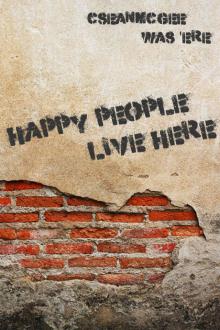 Happy People Live Here
Happy People Live Here_preview.jpg) Alex and The Gruff (A Tale of Horror)
Alex and The Gruff (A Tale of Horror)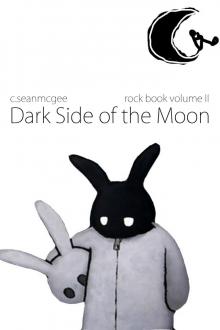 Dark Side of the Moon
Dark Side of the Moon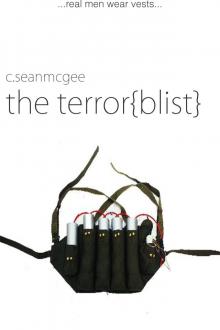 The Terror{blist}
The Terror{blist}_preview.jpg) The Anarchist (...Or About How Everything I Own Is Covered In A Fine Red Dust)
The Anarchist (...Or About How Everything I Own Is Covered In A Fine Red Dust)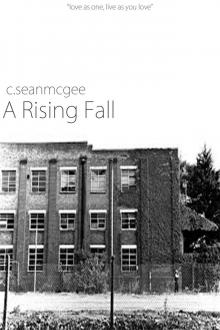 A Rising Fall
A Rising Fall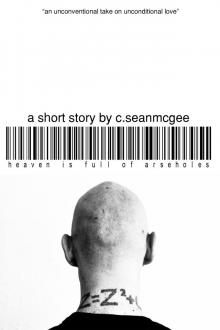 Heaven is Full of Arseholes
Heaven is Full of Arseholes Utopian Circus
Utopian Circus![[2014] The Time Traveler's Wife Read online](http://i1.bookreadfree.com/i/03/24/2014_the_time_travelers_wife_preview.jpg) [2014] The Time Traveler's Wife
[2014] The Time Traveler's Wife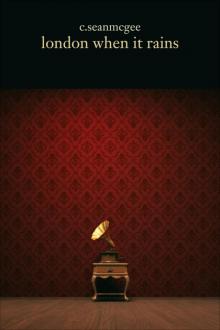 London When it Rains
London When it Rains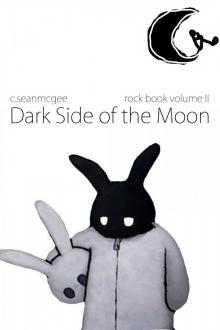 Dark Side of the Moon by C. Sean McGee
Dark Side of the Moon by C. Sean McGee![The Terror[blist] Read online](http://i1.bookreadfree.com/i2/04/06/the_terrorblist_preview.jpg) The Terror[blist]
The Terror[blist]